| Goblin Ready Meals
And Ambrosia Creamed Rice
As the beat boom continued throughout
the years from 1963 to 1966 and more groups appeared on
the national scene, often for just two or three months,
a number of common features emerged. The majority of the
post-Beatle bands had a uniformity of repertoire which
invariably included a mixture of rock 'n' roll standards
(usually from the Little Richard/Chuck Berry/Jerry Lee
Lewis/Carl Perkins catalogues), contemporary chart
numbers (especially Beatles/Rolling Stones) and, in some
cases, a few self-penned compositions.
Rigorous
apprenticeships had been served on the club stages of
Hamburg and other German cities or at the US bases
throughout Western Europe. The sweat-shop hours,
unsanitary living conditions, the demands of many
unscrupulous club owners and a number of other unsavoury
experiences had turned many of the naive, wide-eyed
teenagers who had left on the boats from the Hook of
Holland or Dover into 'world-weary' old campaigners when
they returned only a matter of weeks later. In most
cases however, they also returned as much better
performers.
In fact, the
group who had regularly played at the local palais, or
on the pub and youth club circuits was hardly
recognisable, at least in terms of their sound, from the
group who came back from their' European adventure'.
Once back home, many of the groups sought, if not
already acquired, astute management whose raison d'être
became the negotiation of a recording contract and the
development of a wider audience for the group via the
circulation of their records, gigs which took the group
further afield in the country and greater media
exposure.
Local groups
were quick to realise that a visit to the Continent
could be a 'make or break' moment, especially when they
heard the beneficial effects that such visits had had
for so many of the successful chart groups as well as
many of the 'also-rans'. One of the first Wolverhampton
groups to actually 'test the waters' was Roger and
the Dodgers who went to France in December 1963.
They went to play at the American forces' base at Nancy.
The group included Roger Deeming, Alan
Woolridge, Mike Pugh and Keith Evans.
Since the group was due to play to a camp full of
'hot-blooded' US servicemen it was thought expedient to
include a female singer.
The girl who was
chosen was not from the local area, her name was
Dinah Clunes
and she came from Surrey. The Express & Star
reported that they had gone to France after only a day's
notice (difficult to believe when they had arranged to
use a female vocalist from the South of England). They
spent their first night sleeping in the group's van, the
next night in the Officers' Quarters and finally they
were accommodated about fifteen miles from Nancy. The
group celebrated Christmas at the base. While in France
the group changed their name to the Rinky Dinks.
It would not appear that this early Wulfrunian invasion
of Europe had had to suffer many of the 'notorious'
privations which accompanied many British beat groups
whilst on the Continent.
Keith Evans
who played drums for the Rinky Dinks, and later
for the Black Diamonds and the Californians,
describes one of the 'secrets' of the group's success
with the servicemen (not just the inclusion of an
attractive female vocalist):
"Roger
Deeming was something of a Johnny Cash and the GIs
really liked the C&W stuff The group was quite melodic
and we went down pretty well with the servicemen, as did
the girl singer, of course."
"While we
were in France at that time, we didn't suffer too badly
and in fact the Americans did their best to look after
us really well, especially for the Christmas." |
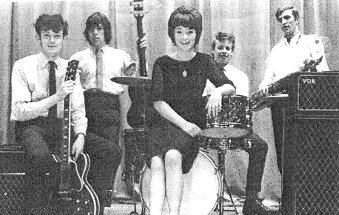
Rinky Dinks.
One of the first Wolverhampton groups to 'invade'
Europe. They set the trend of taking a female singer
along with them. The lady's name was Dinah Clunes. (Mick
Deeming) |
Later in 1964 the Rinky Dinks
were offered another trip to France but turned it down
because they were so busy playing around the local area,
especially the Merry Boys on Willenhall Road
which had become almost a residency for them.
By that time Keith Evans had
left the group and become a member of the Black
Diamonds. He was to return to Germany with that
group the following year. |
|
It was at the
end of 1964 that a group of German club owners arranged
an audition, through the Astra Agency, for some
of the local groups, including the Black Diamonds,
the Montanas, the Sonnets and Steve
Brett and the Mavericks. All four groups were
successful and offered work in various parts of West
Germany, as it was then.
When the
Black Diamonds visited Germany they followed a
similar pattern to the Rinky Dinks, by employing
a female vocalist. The girl who was chosen was Sheila
Deni, a local girl. Roger Clark, the lead
guitarist with the group recalls Sheila joining the
group:
"I don't
think any of us really felt that we needed a girl singer
but it was probably because of her being with us that we
actually got the work in Germany. I remember when she
came along to supposedly audition for us and it became
us auditioning for her."
"When we did
that audition for the German club owner I think it was
Sheila being with the group which probably persuaded him
to take the group on. Mind you, we were definitely a
better group with Sheila than without her. We went over
in the early part of 1965." |
|
Keith Evans
joined the group just before they went over to Germany.
He took the place of the original drummer, Keith
Lansley, who had been with the group from the early
skiffle days.
The new
drummer's memories of the group's time in Germany
include the following:
"We went over
to Germany on a couple of occasions, once as the Black
Diamonds and then as the Californians. The first time we
played at the Star Club in Carlsruhe which was quite a
small and confined club but always full.
We were
billed as being from Liverpool, as were so many of the
British groups which went over to Germany. Our
repertoire then was anything by the popular British
groups of the time, especially the Beatles, Searchers,
Hollies etc." |
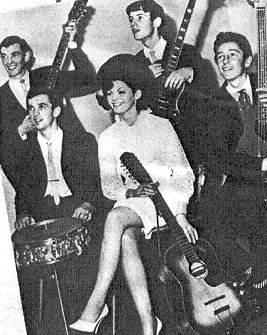
Black
Diamonds & Sheila Deni.
Like so many of the groups who went off to seek their
fortune in Germany it was necessary to take along a
female vocalist. In the case of the Black Diamonds they
took local girl Sheila Deni who proved to be more
popular than the group. |
|
"It was
during that visit I remember Pete Spooner, who was the
lead singer of the Diamonds and the bass guitarist,
getting drunk and having a bit of an accident. The club
had a system by which the electricity supply would go
off if the music was too loud. Anyway, this particular
night the electricity went off and Pete fell off the
stage. He took the other two lads with him. I was about
a metre above them so I was not involved but when the
power came back on, all I could see was a heap of
microphones, leads and three bodies. Pete just waved for
me to play on and I'm afraid I literally wet myself,
especially when the others started to kill themselves
laughing."
"Roger Allen,
who was our manager, came over with us and he quite
fancied himself as a bit of a singer. One night he
decided to sing that old Chris Andrews' number Yesterday
Man and we decided to have a bit of fun Roger’s expense.
We took it up a key, then another and so on until Roger
s face was scarlet and he was shrieking. Even the
Germans in the audience enjoyed that."
The Black
Diamonds and Sheila Deni stayed in Germany
for three months, somewhat longer than their original
contract. When they returned, the Express & Star
was full of rave reviews for them, especially their
female vocalist. The newspaper reported that she had
become something of a 'star' in Germany. She had
appeared on German TV, had her photograph plastered all
over the place and had secured free meals for the group
wherever she appeared because of her popularity. The
group played in a number of cities, including Frankfurt,
Cologne and Duisburg, as well as Carlsruhe. Apparently
her popularity had been greater than the Swinging Blue
Jeans and the Beau Brummels who had also been performing
in some of the same clubs. She had also recorded with
Neil Landon while in Germany. According to Roger
Clark:
"She was
definitely the star as far as the Germans were
concerned, although those weeks in Germany did us the
world of good as a group. We returned a much tighter and
better group than the one which had left Wolverhampton."
In 1964 one of
the town's most successful groups was formed, the
Montanas. Within a relatively short time they had
been over to Germany to perform. The lead guitarist was
Bill Hayward and he recalls some of the more
difficult features of the group's stay:
"It was
incredible just how much they expected you to do while
you were in Germany. We had to play eight 45 minute
spots with 15 minutes in between each spot. In other
words we were playing about six hours in eight hours
throughout the night. You were expected to keep playing
if there was just one person in the club."
"We did a
number of other things while we were in Germany,
including a fashion show where we played the old
Shadows' instrumental, Nivram, throughout the evening. I
doubt if anyone noticed."
"Like most
every one of the British groups who went to Germany we
wanted to play in the same places as the Beatles and we
did get to play on the Reeperbahn in Hamburg. We also
played in Frankfurt, Cologne and Wuppertal. Each of the
clubs we played had their own individual
characteristics. For instance, the club in Frankfurt was
called the K52 and had a line of Mercedes Sports cars
outside the club, each driven by a female chauffeure or
at least that was what we thought the girls were. They
turned out to be a little 'more' than that, offering
other services to patrons."
"In Cologne
the peace in the club was kept by the absolutely
enormous feller called Heinz. I don't recall him having
too much bother with the customers." |
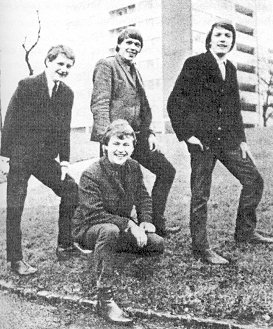
Montanas.
The original line-up with Johnny Jones, Bill Hayward,
Terry Rowley and Graham Crewe. They were to prove
possibly the town's most popular group. They travelled
to Germany and found the German audiences most
appreciative of their brand of music and humour. (Jim
Simpson) |
Johnny Jones
was the lead singer of the Montanas and he
recalls the group's time in Germany:
"Everyone
said that if any group was going to make it, then they
had to play in the clubs of Germany. We went out to
Germany and played in a number of places and it really
did assist the group. After the hours we had to play we
became so much tighter and more together. Mind you I
have never been so tired as when we were playing in
Germany.”
"We worked
really long hours, from the early evening through to the
early morning. At weekends we had to do three hours in
the afternoon as well."
"The music scene in Germany was
way behind that in Britain and in many cases you could
almost get away with murder. You played everything you
knew and more. All the old rock 'n' roll standards, even
nursery rhymes. You lengthened solos, threw in
additional bits and just went round and round Very few
of the punters noticed" |
| "The first time we went to
Germany we came back with nothing, but the next time we
took the advice of a feller who had been playing in
Germany for some time.
His name was Neil Landon and he had
recorded with Sheila Deni while she and the Black
Diamonds were in Germany.
He told us to self-cater, so
the next time we went over we did just that and returned
with some money." |
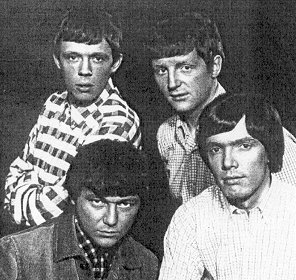
|
Montanas.
The original line-up seen here in a very
pensive mood. (Trevor Westwood) |
|
|
Finders
Keepers went out to
Germany in the mid-60s, as both Roy 'Dripper' Kent,
the lead singer, and lead guitarist Alan Clee
remember:
"The first
time we went out to Germany it was for about five weeks
and we had to work like cart horses. We did the usual
stint of 45 minutes on and 15 minutes off throughout the
night and matinees at the weekends. It was killing but
as so many other groups discovered, it made us a better
band and a closer group of blokes."
"While we
returned a better group, we learnt very little from our
time in Germany because they were so far behind and
expected us to play stuff which we had stopped playing
some time before we actually went to Germany. While the
Beatles had virtually come and gone, the Germans still
expected similar stuff from British groups, us included.
I had to re-learn some of the old rock numbers."
"We played in
Wuppertal, Frankfurt and Cologne. Unfortunately we never
made it to Hamburg. That was a great disappointment to
all of us. The circuit of clubs we played in Frankfurt
and Cologne was called the Storyville and was owned by a
feller called John Marshall. The Frankfurt club was the
more successful because it was near to the American base
so we had loads of Americans coming into the club. They
demanded different stuff from us." |
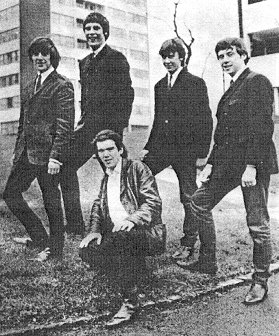
Finders Keepers.
The original Finders Keepers with Roy Kent,
Alan Clee, Ralph Oakley, Jake Elcock and
Dave Williams. They have been photographed
near the
same block of flats as the Montanas. Also
like the Monts they were to prove a success
in Germany. (Jim Simpson) |
|
"It was while
we were playing at Wuppertal that I (Roy) had one of the
greatest experiences of my life because Bill Haley and
the Comets were playing at the club as well. He was one
of my ultimate heroes because it was his stuff I had
first played when I first became interested in popular
music. We had a great time with those blokes. They
actually used our stuff on stage."
"Our stay in
Wuppertal was really difficult because of the awful
living conditions. It was a pig sty, well actually a
converted stable block which was like a pig sty. It had
been partitioned off into cubicles with two beds in each
and little else. With hindsight it was an experience I
suppose. It was only when we went back to Germany some
time later that we lived in a hotel."
"That first
visit we decided to cater for ourselves. I think one of
the other groups, probably the Montanas, advised us to
do so. Anyway we bought a load of Goblin ready meals and
Ambrosia creamed rice which we carried on the top of the
group’s Commer van, covered by tarpaulin." |
|
"We never
thought anymore about those tins until we reached the
border between Belgium and West Germany and were stopped
by the border guards carrying machine guns. Remember
this was at the height of the Cold War so those fellers
were really vigilant. They demanded to know exactly what
we had on top of the van. One of the guards was very
persistent and quite threatening. He probably thought we
were carrying weapons or something. I could not get him
to understand until Alan leant out of the window and
said 'Pudding '. It worked and we were allowed through.
Alan probably saved what could have turned into a
diplomatic incident."
"Living for
five weeks on a diet of Goblin ready meals and Ambrosia
creamed rice was too much for any person's system. When
we returned we had all lost weight and did not want to
see another tin of food. I still think of that if I see
Goblin or Ambrosia tins."
"We probably
did about five trips to Germany over the next two years
and the scene did not really change that much, although
new groups were coming on the scene with some fantastic
equipment. Funk was becoming the in thing and we were no
Funk band." |
|
John Howells
describes the 'time-warp' which the German music scene
seemed to be in when they went out:
"The audition
was organised by Astra. I think we were one of several
groups being auditioned by German Club managers.
We were asked
to play The Walk, a Jimmy McCracken number, and luckily
we had just learnt it so we must have sounded pretty
good and got the spot. To us, a spell in Germany could
only be beneficial to the group." |
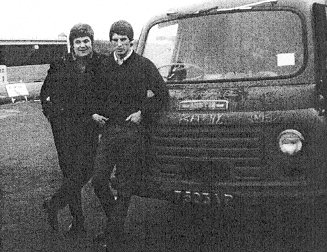
N Betweens.
John Howells and Don Powell just
before the group set off for their first adventure in
Europe. The requisite Commer van is there of course.
(John Howells) |
|
"At that time
we ate, slept and lived the group and the music. Germany
was to be part of the learning process. The strange
thing was when we got out to the clubs we had to play
Chuck Berry and rock stuff which we felt we had grown
out of some time before. The Blues or R&B had no real
place in the German clubs. It was like playing 1963 in
1965."
"The one
mistake we made in Germany was that we did not take the
opportunity to learn a load of new stuff while we were
there. As a result we probably went a bit stale although
we became a much tighter outfit."
"I do
remember that everything we played in Germany seemed so
fast. We cranked everything up and just let rip. When we
got back it took us a little bit of time to slow down
again. I remember playing the Civic and the kids who had
listened to us before we went out to Germany couldn't
believe how fast we were playing. We had to slow down.” |
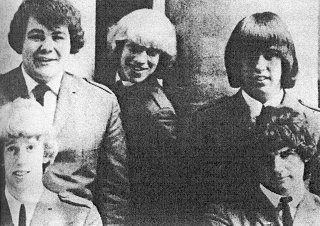
'N Betwcens.
The group which went to Germany with Johnny Howells,
Mick Marson, Dave Hill, Dave Jones and Don Powell. (Jim
Simpson) |
Dave Jones
went to Germany with the 'N Betweens and confirms
the 'time-warp' that the group discovered:
"In Germany
it was as if the Germans had discovered the Beatles and
therefore expected us to do a lot of Beatles stuff,
especially the early stuff. We used to play Love Me Do,
Anna, From Me To You and No Reply. I think we made a
pretty good job of most of the numbers. We had most of
them well sussed.” |
|
"We played
mostly in Dortmund to audiences with an average age of
about twenty five. Although the long stints on stage
were particularly long, they did help us to tighten up
as a unit. We did one session for some German OAPs. We
had to switch everything off because the amplification
was deafening them. We became a group comprising drums
and tambourine for that session.”
One of the other
Wolverhampton groups to play in Germany was Steve
Brett and the Mavericks. He went with two sets of
Mavericks in 1963 and in 1965. The group which went
on the Continent with Steve in 1965 had been hired by
the Astra Agency to replace the original backing
group. The new group had originally been called the
Memphis Cut-Outs and had its origins in T.P. Riley
Secondary School in Bloxwich. One member of this group
was Noddy Holder, the future lead singer of
Slade. The bass player with the 'new' Mavericks
was Pete Bickley and his story confirms many of
the statements made by members of other groups:
"Germany was
really knackering. We had to play for hours from the
evening until the early morning. The club would close at
about five in the morning and we would just fall into
bed and sleep for a fair proportion of the day. It was
even harder at the weekend."
"We played at
the Storeyville clubs in Frankfurt and Cologne. Both of
those clubs were full of some of the dregs of humanity.
There were pimps, prostitutes, gangsters and drug
dealers, all carrying on their trade in full view of the
group. So, there we were miles from home in a foreign
country, aged about 17 or 18 and surrounded by that. It
was horrific.”
"The music we
played at the clubs was anything and everything. We
would repeat the repertoire because the clientele in the
club regularly changed. Many of those who stayed for
hours were usually too drunk to notice that we were
repeating ourselves. The solos played by the group
members would invariably lengthen as the evening went
by, if only to give each of us a bit of a break."
"We probably
played far more instrumentals while in Germany because
Steve’s voice would go regularly, after all he was used
to doing about ninety minutes in Britain and he was
being asked to do something like five or six hours in
Germany. He would probably be better after a couple of
days and then the whole rigmarole would start again.
Noddy used to sing as well of course."
"John
Marshall owned both of those clubs and he employed slave
drivers as managers. One night I was sitting
cross-legged on the stage because I could not stand up,
I was just too tired. The little Hitler, who was the
manager, came up and shouted 'Schnell! Schnell! Up! Up!
Up!' Obviously I had to do as I was told, after all they
were the bosses and they could easily get another group
in at a moment s notice."
"Despite the
arduous conditions, the experience did the group the
world of good because we became better and we were able
to experiment with things which we would never have
tried back in England." |
 |
 |
 |
Return to
the
previous page |
Return to
the Contents |
Proceed to
the
next page |
|